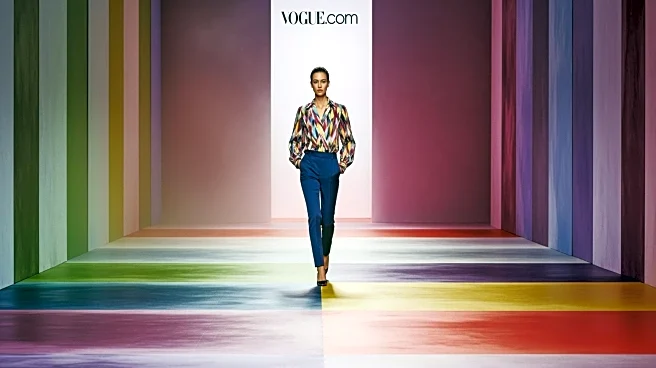What's Happening?
Condé Nast has announced that Teen Vogue will cease to operate as a standalone publication and will be integrated into Vogue.com. This decision marks a significant shift in the magazine's focus, moving away from its progressive political content that has characterized
its recent years. Teen Vogue, which began in 2003, transformed in the late 2010s to cover political issues relevant to young progressives, including LGBTQ+ rights and international conflicts. However, declining ad sales and a strategic pivot by Condé Nast have led to this integration. The move is intended to leverage Vogue's larger audience and resources, focusing on career development and cultural leadership rather than political activism.
Why It's Important?
The integration of Teen Vogue into Vogue.com reflects broader trends in fashion media, where publications are retreating from political content in favor of more traditional topics. This shift could impact the media landscape by reducing platforms for progressive voices, particularly those appealing to Gen Z audiences. The decision may also influence advertising strategies, as media companies seek more predictable revenue streams through subscriptions and events rather than relying on viral political content. The change could affect young readers who have relied on Teen Vogue for political engagement and activism, potentially limiting their exposure to diverse viewpoints.
What's Next?
As Teen Vogue transitions under the Vogue umbrella, it will focus on issues like career development and cultural leadership, which may attract a different audience. The move could prompt other fashion media outlets to reassess their content strategies, potentially leading to further reductions in political coverage. Stakeholders, including advertisers and readers, may react to these changes by shifting their support to platforms that continue to offer political content. Additionally, the integration may influence the editorial direction of Vogue.com, as it incorporates Teen Vogue's legacy and audience into its broader strategy.
Beyond the Headlines
The decision to integrate Teen Vogue into Vogue.com raises questions about the role of media in shaping political discourse among young audiences. As fashion media retreats from political content, there may be ethical considerations regarding the responsibility of media companies to provide diverse perspectives. This shift could also reflect broader cultural changes, as conservative voices gain prominence online, influencing media strategies. The long-term impact on political engagement among young readers remains uncertain, as they may seek alternative platforms to express their views and participate in activism.















